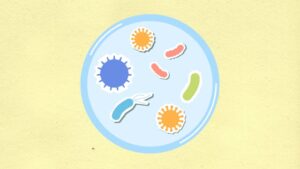Childhood constipation is a common issue, and when children suffer from constipation, it not only makes them uncomfortable but also causes a lot of trouble. However, by making some simple adjustments to diet and lifestyle, constipation symptoms can be effectively relieved. Here are some methods that can help prevent and alleviate constipation in children:
- Eat more high-fiber foods. According to Stanford Medicine Children’s Health, here is a list of foods that contain fiber, which can help relieve your child's constipation:
| Foods | Moderate fiber | High fiber |
| Bread | Whole-wheat bread, granola bread, wheat bran muffins, whole-grain waffles, popcorn | |
| Cereal | Bran cereals, shredded wheat, oatmeal, granola, oat bran | 100% bran cereal |
| Vegetables | Beets, broccoli, Brussels sprouts, cabbage, carrots, corn, green beans, green peas, acorn and butternut squash, spinach, potato with skin, avocado | |
| Fruits | Apples with peel, dates, papayas, mangoes, nectarines, oranges, pears, kiwis, strawberries, applesauce, raspberries, blackberries, raisins | Cooked prunes, dried figs |
| Meat substitutes | Peanut butter, nuts | Baked beans, black-eyed peas, garbanzo beans, lima beans, pinto beans, kidney beans, chili with beans, trail mix |
- Drink fruit juice: A moderate amount of fresh fruit juice may help promote bowel movements, but do not give your child too much juice to avoid diarrhea or stomach pain.
- Eat foods with probiotics: Foods containing probiotics such as yogurt and fermented milk can help maintain a balanced intestinal flora and promote digestion.
- Drink plenty of water: Ensure that your child drinks enough water every day to soften the stool and reduce constipation.
- Eat regular meals: Encourage your child to maintain regular eating habits, avoid overeating or fasting for long periods of time.
- Encourage exercise: Moderate physical activity helps promote bowel movements and reduce constipation.
- Avoid excessive processed foods: Reduce your child's intake of high-fat, high-sugar, and processed foods, which can lead to constipation.
- Establish regular bowel habits: Help your child develop regular bowel habits by establishing a fixed toilet time every day to help cultivate regular bowel movements.
- Pay attention to eating habits: Educate your child to chew thoroughly and eat slowly to avoid eating too quickly.
- Moderate dietary fiber supplementation: Under the guidance of a doctor, consider supplementing your child's diet with dietary fiber, but be mindful of the amount, as excessive intake may cause bloating or gas.
- Addressing childhood constipation requires patience and ongoing efforts. If your child's constipation problem persists or worsens, please seek medical attention promptly.
References:
https://www.stanfordchildrens.org/en/topic/default?id=constipation-in-children-90-P01986













